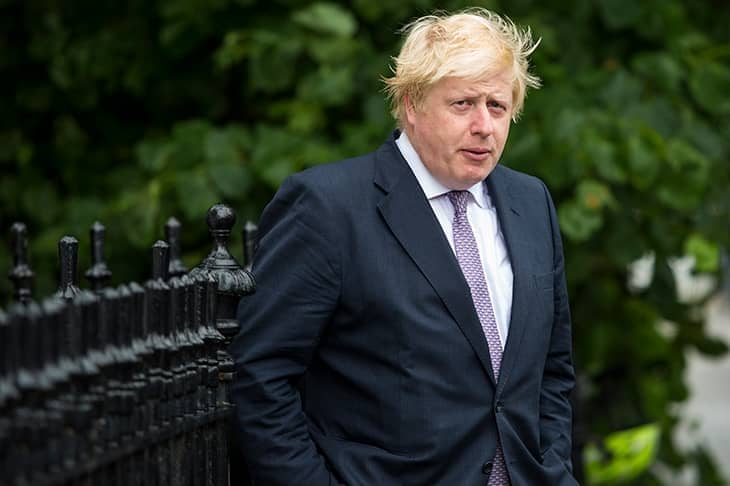The anger against the Prime Minister for failing to observe the rules which he imposed upon the rest of us is justified. Even so, there will come a point at which the public starts to ask: aren’t we spending too much time obsessing about the parties?
Johnson’s electoral mandate gives him the chance to redeem himself; to show that he has the ideas to get Britain out of this mess and that although he may make mistakes over more trivial matters, he gets the big decisions right.
In defying Sage’s advice in December, Johnson saved Britain from a needless lockdown. He could and should have done this at a far earlier stage last year, but he nonetheless deserves credit. He should now move on to the next phase of his leadership, and show us what he means by those much-repeated soundbites: ‘global Britain’ and ‘levelling up’.
The levelling up white paper is a heroic attempt to make verbiage look like policy
The lockdowns he imposed — which were longer and harsher than in most European countries — took the country in the opposite direction. They deepened inequality and weakened Britain’s links with the outside world. His party needs to ask how this damage can be repaired.
The levelling up white paper published this week is a heroic attempt to make verbiage look like policy, and to give the appearance of a serious agenda where in fact there’s only baseless assertion.
It sets ambitious goals with specific figures: healthy life expectancy to be increased by five years by 2035; the number of highly skilled workers to be increased by 200,000 each year. The language of centrally planned economies now comes easily to Tories. But the paper is strikingly weak on how the government can achieve its lofty goals. Michael Gove, architect of the policy, says Renaissance Florence was his inspiration. As James Forsyth argues on page 10, it is telling that he has found no more contemporary examples of effective ‘levelling up’. In contrast, Iain Duncan Smith’s welfare reform was based on a successful experiment in Wisconsin, while the transformative free school agenda was based on Swedish policies and the charter school movement in America.
Central to the levelling up agenda is the idea that devolution is an effective tool, and that it will increase the wealth of the regions. But the Blair and the Cameron years contained both successful and failed experiments. In 1999 Wales and Scotland were given devolved parliaments with significant powers, but both countries are still poorer per capita than England. The gap hasn’t closed.
Gove’s school reforms in the coalition era worked because they took power away from local politicians and handed it to teachers and parents. Town hall bureaucrats hate opening new schools if there are places to fill in bad ones. Gove’s remedy was to allow new schools to open and parents to choose. This was informed by the basic Tory principle that people, if empowered to do so, make better decisions for their families and communities than politicians make on their behalf.
Devolution doesn’t work if power is simply handed over to a new set of local politicians. This is the lesson of the last quarter–century, but it is one the Tories seem unwilling to learn. The most immediate way to help workers in the north of England, for instance, is to let them keep more of the money that they earn — knowing they will spend it more wisely than the government is able to. Yet this Tory government will soon lift the tax take to a 71-year high.
Johnson was a stunningly effective election campaigner and his mercurial but decisive style of governing broke the Brexit logjam. But his faith, now, seems to rest in Big Government — with its central targets, hunger for tax and endless infrastructure projects. The net-zero target represents a huge expansion of state power. HS2 will allow people to reach London a little faster, but it’s far from clear that it will do anything to help regional economies, as the record of such projects abroad has established.
In a few weeks, a National Insurance rise will take an extra 2.5 per cent of wages: with half the money paid by the employer, half by the employee. The money is not (as the government pretends) being reserved for post-Covid repair: its real purpose is to subsidise care-home costs. The end result of this will be that the poor end up paying for the relatively rich. A junior nurse will pay tax to ensure a millionaire doesn’t have to sell their house to pay for care. This is a grotesque inversion not just of the principles of the welfare state but the idea of levelling up.
The Prime Minister is now on operation clean-up: seeking to clear the political and reputational damage caused by his failure to follow his own rules. The Met Police are investigating and his colleagues will decide whether or not to change leader once the report is public. Part of the decision will rest on whether they believe Johnson is capable of delivering the fairer, low-tax society that he explicitly promised in the 2019 general election — or if he has now set Britain on the opposite path. On this substantial question, the jury is still out.






Comments